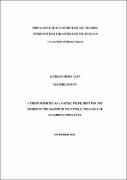| dc.description.abstract | Malnutrition is a prevalent challenge in South Sudan and training interventions for mothers to
address this challenge are in place in various counties. The purpose of the study was to assess
the nutritional training interventions for mothers aimed at mitigating malnutrition among
children in South Sudan. The objectives of the study were to identify and assess the nutrition
training interventions for mothers being carried out in Dengershufu Payam in Malakai
County; to establish the critical measures put in place to reduce malnutrition, and to establish
appropriate training options for curtailing the prevalence of malnutrition.
The data collection methods employed in the study were qualitative in nature; and the
research instruments used were interview guide, Focus Group Discussion (FGD) guide and
the observation checklist. Results showed that, there were various players in designing
training intervention programmes for mothers in South Sudan; these included; the
Government of South Sudan (GOSS), UNICEF, and NGOs. UNICEF taking the leading role.
The results also revealed, that the measures used in mitigating malnutrition in Dengershufu
Payam include; community sensitizations, awareness, promotion of exclusive breastfeeding
and support for breast feeding mothers: encourage pregnant mothers to attend ANC visits and
hygiene promotion. During the study I realized that, the training was helpful in making
mothers aware and responsive to the challenges posed by malnutrition, however the training
alone would not be sufficient enough to combat the problem of malnutrition without
empowering mothers with means to earn in order to afford the diet. In regards to the finding
the following recommendations were made: that nutrition education needs to be added in the
school curriculum so as to empower future mothers and fathers with malnutrition preventive
measures. Nutrition training curricula in south Sudan should be modularized according to the
needs of mothers. The training should be flexible in accordance with the existing lifestyles of
the people of South Sudan and pedagogical approaches to vocational training. Nutrition
training curricula for mothers should be made more practical; it should use more of the visual
teaching aids such as diagrams, posters, demonstrations, videos recordings, models, role
playing, models cooking classes and audio visual communication rather than the usual
theoretical approaches to teaching and learning. Public private partnerships (PPPs) with other
stakeholders and sectors such as agriculture, health, education, media and NGOs should
jointly carry out training so as not to send mixed or contradictory messages. In line with
pedagogical approaches, nutrition training for mothers should be conducted in learning
groups and teams so that the difficult learning tasks are shared and understood by all; tools,
equipment and materials should be sufficient and up-to-date; given the cultural and gender
power relations in Africa and South Sudan, where men traditionally control resources and are
assumed to be the bread winners, they should also be involved in the training. | en_US |

